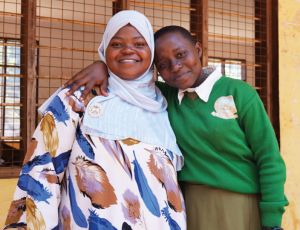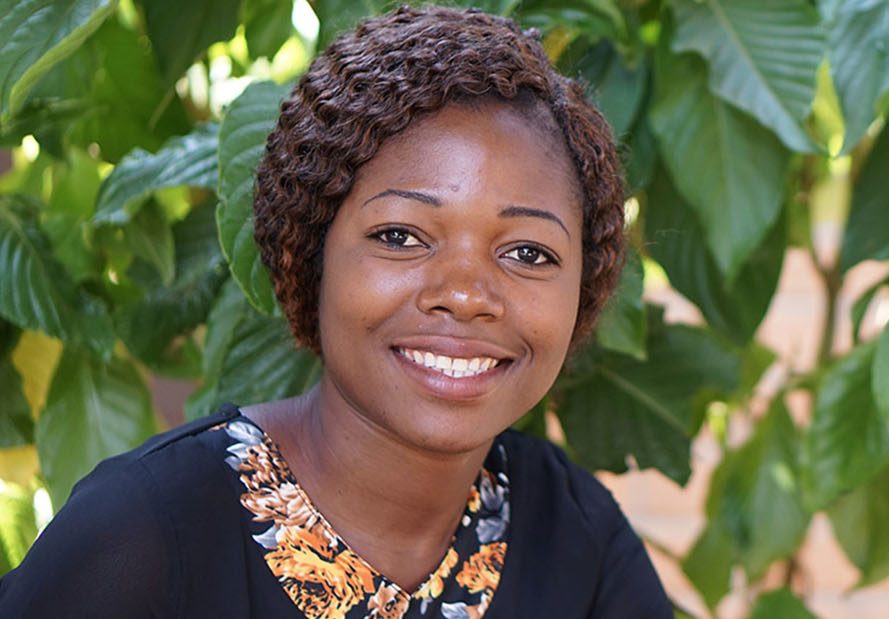Sustainable Agriculture Expert, Malawi

When she thrives, we all thrive
Together this giving season, we can make a difference that ripples outward to benefit everyone.

Sustainable Agriculture Expert, Malawi
I am a fourth born daughter in a family of eight, and the first person in our family to complete secondary education. Now, I can say I’ve reached great heights because of the support I received from CAMFED. I have gained great respect in our family and I want to go even further to assist my parents and relatives.
My future didn’t always look so positive and at one time I thought I would have to drop out of school. A member of my community had noticed my promise and assisted me with Form 1 (the first year of high school in Malawi), but suddenly they were no longer able to help. I was very sad and thought that I couldn’t go any further with my education. That’s when CAMFED started supporting me* and my life really changed. Indeed, that’s what made me work extra hard during my school days, and even now — I still want to go forward with education!
I first joined the CAMFED Association, CAMA, in the year 2015, after I had written my Malawi School Certificate of Education Examination. I am a proud member. In the network we do a lot of things, including philanthropic activities like buying school uniforms, exercise books and pens, providing school fees, as well as guidance and counselling for needy students. I’ve also gained experience as a leader, and was previously the Chairperson at cluster level. In 2018 I was invited to a local school as guest of honor — I’m a role model to many. It motivates others to see me because people know the background of our family, and they think ‘if she managed to reach this stage, that means I can too’. I want people to know:
Although you are facing all these challenges, it’s not the end. Educating a girl child — it can mean everything really changes.
After school I started a small business selling fritters whilst I was waiting to hear about admission to public university. Unfortunately I did not get picked, but I had already made the decision that I wasn’t stopping there. With the profits from my business I was able to assist my family and put some savings in the bank to help me achieve my future goals. I decided to apply for a vacancy as a Food Assistant for the Ministry of Agriculture. I found out I had been selected for an interview and I used some of my money to help me make the two-hour journey from Dedza to Lilongwe. Then I was shortlisted and finally accepted. That’s how I got the opportunity to join tertiary education at Lilongwe University of Agriculture and Natural Resources (LUANAR) to do my three-year diploma in General Agriculture.
As it is a government scheme, once you finish the course, you retain your position and can work towards a promotion. Now I can proudly say that I am an Agriculture Extension Development Officer. With my earnings, I have managed to pay for the wiring of my mum’s house — it is the only house with electricity in our community.
I have brought electricity to our family and to our community, which is a great change.
People around us are aware of this transformation in our lifestyle — in the past we used to go in the mountains to collect wood or whatsoever we could find to support ourselves. These days life is much more comfortable.
It’s not only my relatives who benefit from my education, it’s my entire community.
As a CAMFED Association member I want to provide this assistance for others. I am a multiplier, paying forward the benefits of my education. Firstly I assisted my close relatives by buying school uniforms for five children including my brother’s son and my sister’s two children. When they say ‘auntie, we don’t have funds’ I step in to provide them with their needs. Even people from the community might come and say, ‘our child is facing this challenge, can you assist us?’ I do my best to provide the financial or emotional support, like counselling, that the student requires. So far, I can say I am supporting 12 children to go to school.
And because of what I learned at college, I am also able to provide solutions for my fellow CAMFED members and for others in the community. I can give advice, for example, on maize production.
Miriam has blazed a trail for young women in rural Malawi by completing secondary education, higher education, and securing employment. She mentors and supports others in their journeys through school, university, and in sustainable businesses.
I pass on my knowledge about proper spacing, planting, fertilizer application, watering, weeding. It’s important to weed as soon as possible, to reduce the competition from the weeds for soil nutrients — that will improve your maize harvest later down the line.
Climate-smart methods play an important role in these improvements, leading to greater production and increased food security, whilst conserving the environment.
I encourage farmers to focus on integrated management — a whole farm approach that is more sustainable — and to practice early planting and combining different crops. I teach mulching to conserve soil moisture and reduce evaporation, and I advocate for tree-planting to prevent soil erosion.
There are also new varieties of maize and other crops to help farmers build resilience to climate shocks. So I tell people about drought resistant crops that avert food insecurity. And then even after the harvest, when it comes to processing, I guide CAMFED Association and community members about combining different foods into our staple maize mix to help make it more nutritious.
By providing this guidance and information I am helping to reduce malnutrition issues.
In the past, my family was poor. Although we were farming, our yield was very low because we could not afford inputs like fertilizer. We had no choice but to go into the forest and cut down trees, so we could make and sell charcoal. It was bad, but it was the only way to get food in our family.
Now, with my knowledge and my salary, each and every time we have a good vegetable yield. We grow maize, greens, Irish potato, sweet potato, and soya, and we have chickens, rabbits and pigs. When we sell the livestock then we can buy basic needs and reinvest in our farming. We manage to feed ourselves throughout and to sell the extra to people in our community. Everything really has changed.
*Miriam’s school bursary — a holistic package of support including fees, uniform, shoes, sanitary pads and stationery, as well as guidance from a trained Teacher Mentor — was made possible through funding from the UK government’s Foreign, Commonwealth and Development Office (FCDO).
Oleme Sanon $5.6
Vincent Peloso $52.9
Rocko Smucker $68.7
Nyela Amadi $26.6
Emiliano Conde $558
Jeremy Blain £57.4
Geoffrey Acaye £47
Sara Mikael $106
Denae Whaley $20
David C Murray $3783
Trenay Hoye $10.9
Caroline Fenton £100
Victor Mesny $500
Niko Gomes $316
Katja Guenther $263